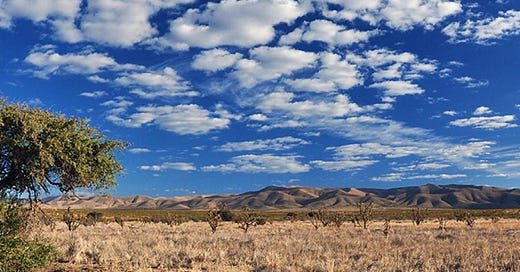On a recent night over wine with a couple of friends, I asked the question I had asked my wife earlier that day.
“If you could live anywhere in the world, where would you live?”
I asked them to dismiss the pull of aging parents, children, nostalgia, and to consider that they were reasonably comfortable financially.
“This would be your ultimate place. Where would it be?”
Earlier that day when I asked my wife, the answer was what I had expected. Probably the Pacific Northwest, she said. Oregon, most likely. Mine? Most likely somewhere remote—a desert retreat near Joshua Tree or along a vast stretch of New Mexico in Georgia O’Keefe land. But I also think of coastal Ireland, a remote roughed Scottish island, somewhere along stretches of northern pines. Wide open spaces, the kind you want to reach out and touch but find yourself lost in the horizon. Of course, I wouldn’t mind the PNW one bit. We’d be together in one great compromise.
Our friends were less certain. Ireland came up. “Somewhere near water, for sure,” one said, But the question seemed, in all honesty, to perplex them. And after thinking about it more, it would perplex many of us. It’s hard to imagine an altered life from what one might have always known. The beauty of a dream is sometimes defined by its unattainability. The dream ends when we can reach it.
Each year, the Economist Intelligence Unit ranks the best places to live in the world. Top places, based on several factors, including culture and environment, beauty, healthcare, and infrastructure. It found Vienna, Austria as the number one spot. Copenhagen and Geneva, Switzerland were near the top. There was not one US city in the ranking. When a similar study looked at only American cities, Honolulu was first. Atlanta, Pittsburgh, and Seattle rounded things out. All of those, certainly, can be debated.
Still, these kinds of rankings are not exactly what I was considering. The place I’m searching for is one’s personal paradise, the place that speaks to your soul, the place that feeds your senses every day. These are intangible elements, aspects that cannot be assessed through data or statistics.
The question is also one that is weighted by who is asking. The question is clearly a “First World Question.” The thousands of migrants currently clamoring to find a homes in America would find the question highly unrealistic. They are fueled by very different needs, sometimes ones of desperation and questions of life-or-death. Their perspective is not the same as mine or my upper middle class, wine-drinking friends, enjoying each other’s company over a fire pit on a crisp autumn evening. So, life’s consequences play a role here, too. Plus, choosing a place to live is a modern indulgence and certainly a First World luxury. Studies show there are currently some 80 million forcibly displaced people in the world, leaving their homes because of war, oppression, or poverty. They don’t have much choice in the matter.
There is also the issue of cultural and familial traditions.
I grew up in Pittsburgh in an era when no one left. If you were born in Pittsburgh, you died there. When I moved to the Chicago area at the age of 30, I was considered a nomad, a stranger, an outlier. No one in my family had done this. My parents raised their children in the same section of the city as their parents did. Generations not only stayed in the same town, they stayed on the same street. Moving anywhere, fueled by wanderlust was never a consideration.
There are so many stunning and inspiring places in the world. Being surrounded by beauty is likely one consideration when determining the ultimate place to live. But the choice of your personal paradise is about more than a great view, and certainly more than the practicalities of living—healthcare, education, economics. It’s about something deeper, something hard to fully understand. It’s a place that heals you without knowing, feeds your spirit even when it’s not hungry, and permits your heart to find peace you didn’t know was possible. Some call these the “thin places,” because there is such little space between heaven and earth.
Still, after more consideration of the question, I wonder about its true purpose and viability. It’s been said over and over in many ways: Wherever you go, there you are. No matter the place, you will always take yourself with you and you will always find yourself. In her collection of contemplative essays The Solace of Open Spaces—a memoir on the importance of place and finding peace—Gretel Ehrlich writes, “True solace is finding none, which is to say, it is everywhere.”
Our paradise might be right outside our own door.
David W. Berner’s book The Consequence of Stars is a contemplative memoir-in-essays about the concept of home, what it means and why we seek it.
Photo: USDI





Definitely a first world issue, but still so true and well put. We feel blessed to have found our happy place in The Berkshires, although we were in Vienna a few months ago and it’s pretty fabulous.